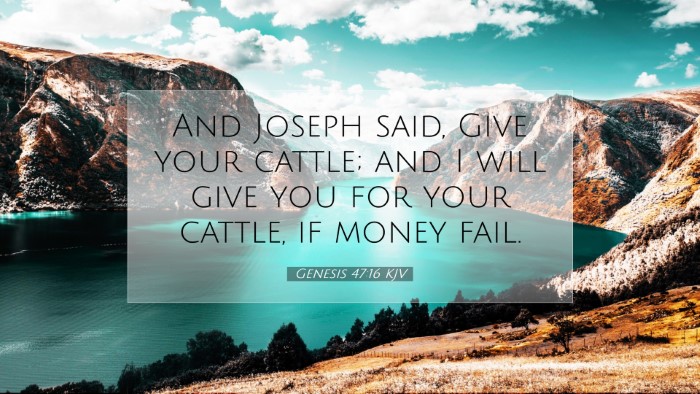Commentary on Genesis 47:16
Verse: "And Joseph said, Give your cattle; and I will give you for your cattle, if money fail." (Genesis 47:16, KJV)
Contextual Overview
This passage occurs during a time of famine in Egypt, where Joseph, appointed by Pharaoh, was managing the distribution of grain. The famine had severely afflicted the land, driving the people to desperation. Joseph's pragmatic leadership is highlighted as he negotiates the exchange of cattle for food, showcasing his wisdom and foresight.
Commentary Insights
Economic Exchange
Matthew Henry: Henry observes that Joseph's strategy illustrates the principle of wise stewardship. Rather than merely handing out provisions, Joseph requires a productive sacrifice from the people, ensuring the sustainability of resources. This exchange reflects God’s providence, where the faithful manage their resources judiciously, even in trying times.
Albert Barnes: Barnes emphasizes that the proposal to trade livestock for grain highlights the seriousness of the famine. The people have depleted their monetary resources and are now resorting to their important assets, their cattle. This reflects both the desperation of the populace and the bold leadership of Joseph, who provides a practical solution during an economic crisis.
Theological Implications
Adam Clarke: Clarke interprets this transaction as significant in demonstrating the dependency of human life on God's provision. The cattle, an important symbol of wealth and sustenance, represent the offerings individuals must make for their survival. Joseph's role is a poignant reminder of Christ, who also provides for the needs of His people, effectively exchanging their spiritual poverty for eternal wealth.
Leadership Qualities
The leadership qualities exhibited by Joseph serve as an example for modern-day pastors and leaders. He displayed foresight, compassion, and firmness in his dealings. Throughout the famine, he continues to safeguard the interests of both the Egyptian people and Pharaoh, asserting the importance of ethical leadership.
Characteristics of Joseph's Leadership:
- Wisdom: He employs shrewd strategies to alleviate the crisis.
- Compassion: He addresses the needs of the vulnerable and suffering.
- Integrity: His dealings are transparent and focused on the welfare of others.
Practical Applications
For pastors and theologians, this verse can serve as a basis for discussions on resource management and stewardship. The exchange concept portrayed by Joseph can be a template for pastoral care in congregational networks. How do we utilize our resources for the betterment of our communities? Joseph's actions teach us about the delicate balance between provision and exchange, reflecting the relational aspect of ministry.
Lessons on Stewardship:
- Recognize Needs: Identify and address the needs within the community.
- Facilitate Exchange: Encourage an environment of giving and receiving.
- Trust in Providence: Allow faith to guide financial and communal decisions.
Conclusion
Genesis 47:16 reflects a poignant moment of human desperation met with divine provision through Joseph’s actions. It is an illustration of how leadership in times of crisis requires wisdom, compassion, and ethical considerations. For scholars, pastors, and students of the Bible, this passage encourages deep reflection on the nature of our resources and our role as stewards in God's grand narrative.


